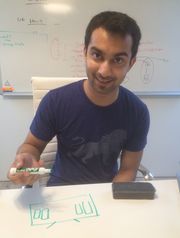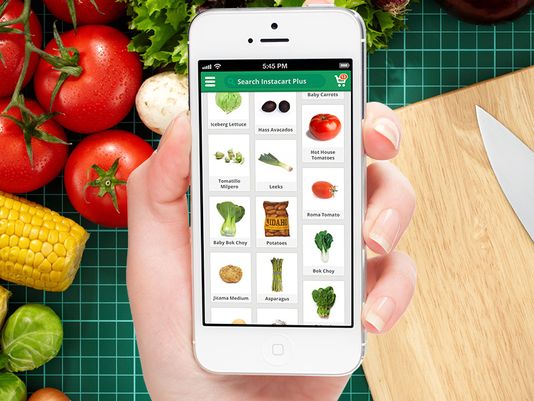Delivery start-up Instacart follows rain to Philly
SAN FRANCISCO — Want to know what city will get fast-growing grocery delivery service Instacart next? Follow the weather.
The start-up, run by former Amazon.com fulfillment whiz Apoorva Mehta and backed by venture capital legend Mike Moritz from Sequoia Capital, launches in Philadelphia, its fifth city, on Tuesday.
Instacart got started in San Francisco in 2012, offering one- to two-hour delivery from local grocery stores. It expanded to Chicago, Boston, Washington, D.C., and now Philadelphia and hopes to be in 10 U.S. cities by the end of 2014.
Instacart has developed a system for picking which cities are the best to expand into, and Mehta gave USA TODAY a peek inside this "feasibility matrix" during a recent interview at the company's San Francisco headquarters.
The system provides a window into the strategy of a start-up that has grown its revenue by a multiple of eight since August and is challenging some of the world's largest retail and technology companies for a slice of the local commerce market.
Hundreds of billions of dollars are spent each year in nearby stores. A large chunk of this buying is expected to move online in coming years, and Amazon, Wal-Mart Stores, Google and eBay are scrambling to prepare.

Instacart Founder Apoorva Mehta.(Photo: USA TODAY)
Instacart's Mehta thinks his firm has an advantage because it does not have to invest in stores, warehouses or delivery trucks. Instead, the start-up uses software to link customers to existing grocery stores and a small army of people who have signed up to be independent shoppers.
Customers enter orders online and Instacart alerts these "personal shoppers" who drive to the grocery store, purchase the items and then drive them back to customers' homes. The customers pay a delivery fee to Instacart, and the start-up pays the shoppers a commission.
"Amazon is a formidable competitor," Mehta said. "But we have structural advantages. We can launch quickly, rather than wait six years to launch in a new city."
Mehta was referring to Amazon's grocery-delivery service AmazonFresh, which started in Seattle in 2007 and expanded to Los Angeles and San Francisco in 2013. To enter these new cities, Amazon had to build new fulfillment centers and set up a fleet of delivery trucks, a costly endeavor.
In contrast, it costs Instacart about $30,000 to start in a new city and takes about three weeks to get up and running, Mehta said. In roughly six months, the service becomes profitable, he added.
Instacart has a team focused on choosing which cities to expand into next and they have drawn up a list of factors. One of the main ones is weather. The more it snows or rains, the better because people are less inclined to visit the grocery store when the weather is poor.
In D.C. and Philly, the latest cities, there is precipitation about one-third of the year. While Chicago and Boston get a lot of cold, snowy days.
"There's a noticeable lift in orders when the weather is bad," Mehta said.
The launch team looks at other factors, too, including household income and size — the higher and larger the better. The percentage of households without cars, population age and density are also considered.
If other grocery-delivery firms are already in a city, that shows there is demand for the service. And if a city's public transport system is weak, that is also a positive sign for Instacart because shoppers have fewer ways to get to the grocery store.
Instacart came to Chicago in October, and by the third week the company was handling more deliveries than in the 33rd week after it launched in San Francisco, its first city. Chicago is overtaking San Francisco in terms of delivery volume and revenue and Boston, which launched in late November and early December, is growing faster than Chicago, Mehta said.
Such promising results have caught the attention of Instacart's bigger rivals. Mehta said he has received acquisition offers in recent months from "the usual suspects." He declined to identify specific companies.
Mehta wants Instacart to remain independent and has bigger plans for the business.
"We're starting with the ability to deliver groceries, but we are a software company and have a lot of avenues to grow into other verticals," he said.










